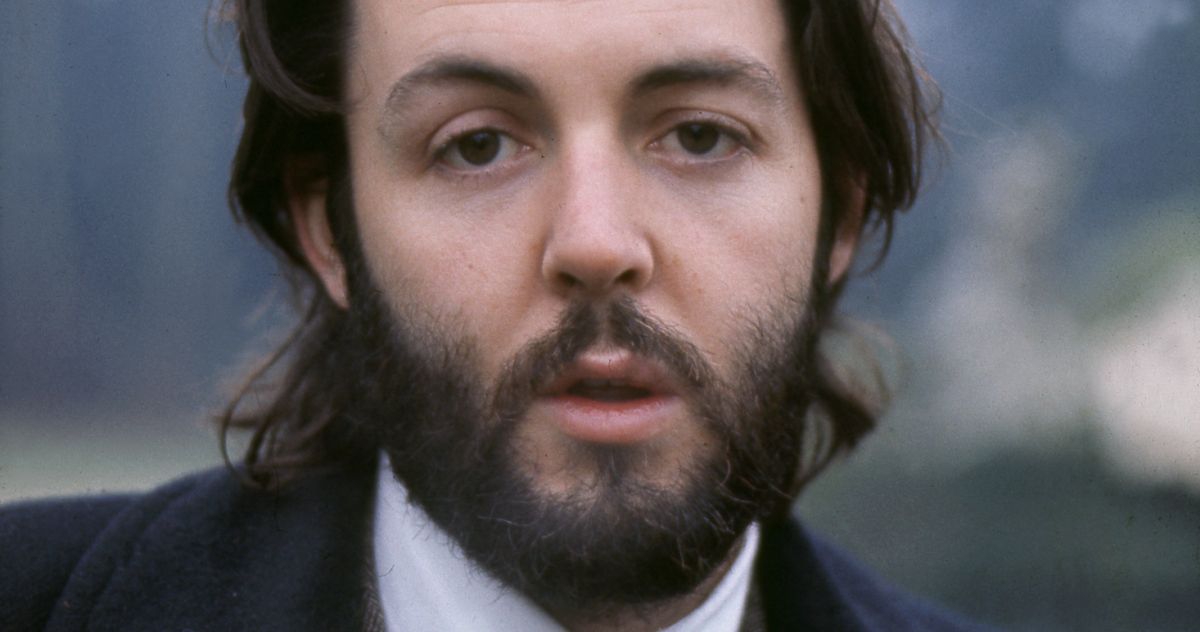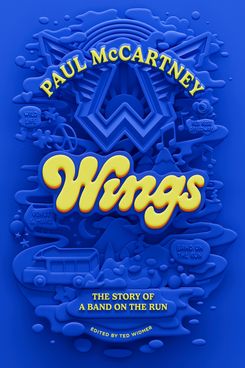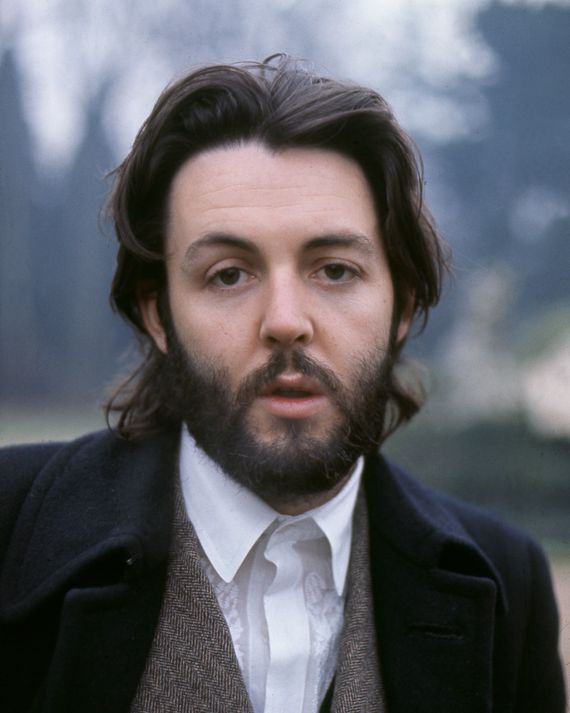
Paul McCartney. Campbeltown, Scotland, 1969.
Photo: 1969 Paul McCartney under exclusive license to MPL Archive LLP. Photographer: Linda McCartney
Even if Paul McCartney had permanently hung up his instruments after the dissolution of the Beatles, he’d still be regarded as one of the best songwriters in rock history. Watch him in the invaluable eight-hour documentary Get Back, and you’ll see a meticulous 26-year-old leader who’s constantly writing, revising, rearranging, and pushing his bandmates (no slouches themselves) to elevate a song from merely perfect to immortal. So what else is there to do after reinventing pop music forever before even turning 30?
Apparently, you run away to a desolate Scottish sheep farm and plot a second chapter for the ages. As McCartney writes below in the foreword to his upcoming book, Wings: The Story of a Band on the Run, a funny narrative was forming around himself and his new wife, Linda: They’d traded Swinging ’60s London for sleepy ’70s Scotland, yet the rest of the world thought Paul was simply dead. In reality, he was working on his new life. His next decade would bring on an ambitious new band, endless trips around the world, and ten albums that would grow to be, among later generations, as beloved as his previous band’s records. It would also involve headline-grabbing controversies, a stay at the Tokyo Narcotics Detention Center, and, inevitably, another musical breakup. But, of course, McCartney’s story wouldn’t end there. It’s still being written today by the man himself.
“Well, the rain exploded with a mighty crash as we fell into the sun.”
The strangest rumor started floating around just as the Beatles were breaking up — that I was dead.
We had heard the rumor long before, but suddenly, in that autumn of 1969, stirred up by a DJ in America, it took on a force all its own, so that millions of fans around the world believed I was actually gone.
At one point, I turned to my new wife and asked, “Linda, how can I possibly be dead?” She smiled as she held our new baby, Mary, as aware of the power of gossip and the absurdity of these ridiculous newspaper headlines as I was. But she did point out that we had beaten a hasty retreat from London to this remote farm up in Scotland, precisely to get away from the kind of malevolent talk that was bringing the Beatles down.
But now that over a half-century has passed since those truly crazy times, I’m beginning to think that the rumors were more accurate than one might have thought at the time. In so many ways, I was dead … a 27-year-old about-to-become-ex-Beatle, drowning in a sea of legal and personal rows that were sapping my energy, in need of a complete life makeover. Would I ever be able to move on from what had been an amazing decade? I thought. Would I be able to surmount the crises that seemed to be exploding daily?
Three years earlier, I had bought this sheep farm in Scotland on the suggestion of one of my accountants. At the time, I wasn’t very keen on the idea — the land seemed sort of bare and rugged. But, exhausted by the business problems and realizing that if we were going to raise a family, it would not be under the magnifying glass that was London, we turned to each other and said, “We should just escape.”
Looking back, we were totally unprepared for this wild adventure. There was so much we didn’t know. Linda would later go on to write famous cookbooks, but at first — and I’m a living witness — she was not a great cook. I was hardly any better suited for rural life. My father, Jim, still in Liverpool, had taught me many things, especially how to garden and love music, but putting down a cement floor was not one of them. Still, I wasn’t going to be deterred. So, I got a guy to come up from town who taught me how to mix cement, how to lay it down in sections, and how to tamp it to bring the water to the surface. No job seemed too small or too large, be it cutting down a Christmas tree from the local forest, making a new table, or getting on a ladder to paint an old roof. A big challenge was to shear the sheep. We had a guy called Duncan who taught me how to use old-fashioned shears and put a sheep on its haunches. Even though I could do only ten sheep to his hundred, we were both knackered by the end of the day. I took great satisfaction in learning how to do all these things, in doing a good job, in being self-dependent.
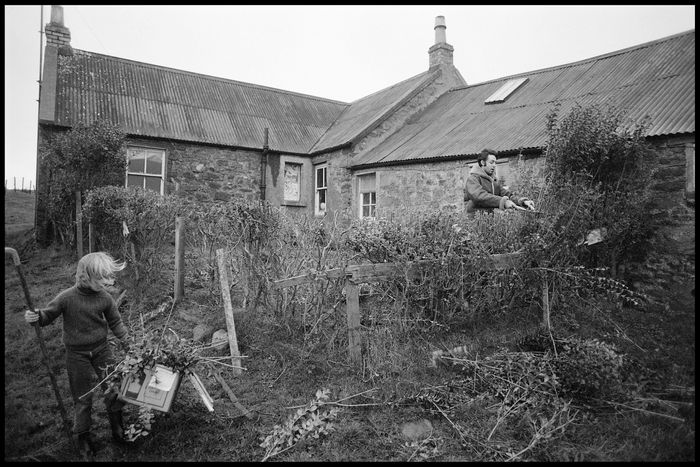
Heather and Paul McCartney. Campbeltown, Scotland, 1969.
Photo: 1969 Paul McCartney under exclusive license to MPL Archive LLP. Photographer: Linda McCartney
When I think back on it, the isolation was just what we needed. Despite the harsh conditions, the Scottish setting gave me the time to create. It was becoming clear to our inner circle that something exciting was happening. The old Paul was no longer the new Paul. For the first time in years, I felt free, suddenly leading and directing my own life. I was not conscious at the time of moving away from the long shadow cast by the Beatles, but that was exactly what I was doing. And in creating these early songs that would become part of McCartney, RAM, and Wings’ early songbook, I was doing stuff that I hadn’t been able to accomplish in the past.
Essential to this newfound freedom and success was Linda. On the surface, she and I came from very different backgrounds. On a deeper level, though, we had both been preparing for this journey, this escape to Scotland. She had had a pretty conventional upbringing, growing up in quite a traditional family in Scarsdale, which had not the slightest resemblance to Liverpool. She was supposed to have become a society wife, with the right number of children, going to the right schools and all that, but she wanted to break free of the strict life that had been laid out for her. At first, she got into photography and loved the freedom that came with it; at an early age, she became a big expert on the rock-and-roll explosion, so much so that she often knew a lot more than I did. But my own journey complemented hers in so many ways, particularly in the way we were both so curious and self-reliant. While my fellow Beatles bought big houses and escaped to the suburbs, I decided to stay in London and absorb as much of the ’60s culture as I could — visiting the theater, hanging out with and learning from avant-garde composers, experimenting with tape loops, helping to set up the Indica Bookshop, where we’d get to hang with folks like William Burroughs and Allen Ginsberg, or going to the home of Bertrand Russell for a chat. Without even knowing it, the paths of Linda and me, while on the surface so different, were strangely converging — at first in London, where we met, but here in High Park, where we would raise our family and create a new band that would help shape my artistic life for the rest of my career, including a wide range of Wings songs I still play in my current set.
For so many decades, I tried to pack away these stories about how I felt when the Beatles collapsed and what happened in that period just as we were launching Wings. Like everything else, it’s a timing thing. Nobody had specifically said, “Let’s do a Wings thing.” But suddenly, Wings has found its moment again. I remember doing an interview with a young guy, I think it was with Rolling Stone, and I was talking about Sgt. Pepper and the Beatles, and so on and so on. And he said, “Well, yeah, I get that, but that’s really not my period.” He said, “I’m more interested in Wings and Band on the Run.” I thought, Here we go. We have a generational shift at work. That’s his nostalgia period, and it’s not the ’60s, and that’s sort of what’s happening with a lot of people. I was very happy to be transported back, like being on a magic carpet, into that period. It awakened so many beautiful memories for me of our times back then.
The book is filled with all kinds of lovely details, many that I have not thought of in over 50 years. It’s best that they be fully related in the oral history that follows, but a few things are worth mentioning here. People often ask me about how the Band on the Run title came to me. I recall that around that time, a lot of young people, especially in America, were feeling this kind of hippie desire to be free from so-called chains, as if we were desperadoes busting out of jail. You’d see bands emulating this sort of thing, where they would be on a porch, looking like old cowboys from the 19th century. I thought, Yeah, we’re desperadoes, we’ve just broken out of prison, what an idea for a song. I wrote about being “stuck inside these four walls,” and then we escaped — boom, boom, boom — and we’re now out. It just summed up this freedom with “Band on the Run.” Just catch us if you can.
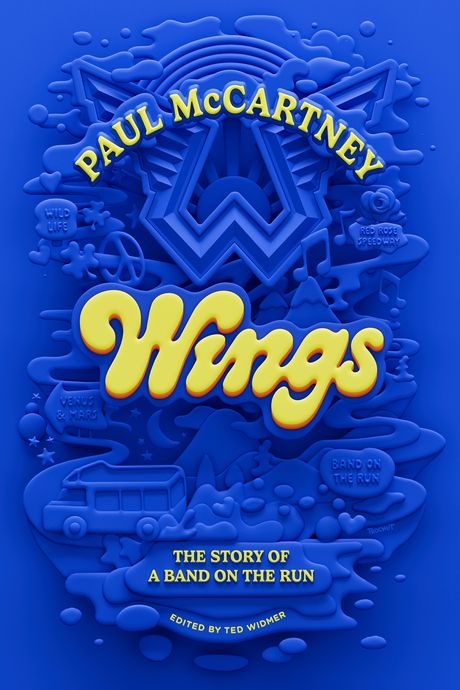
Photo: Liveright
Back then, we were young people trying to find a new way, trying to find our own identity, rather than just doing what we were supposed to be doing, so I felt like a lot of people could identify with us — and can still identify with Wings today. A lot of this meant that we just could not do something in normal style, as in the standard way that groups were being transported around England or Europe. Most would, you know, just get a little van or a school bus, but we searched for and found a double-decker bus. It was built in 1953, though we painted it psychedelic to match the newer times. Some people believe I managed to take the top off myself — which, I’ve got to be honest, remained beyond my skills — but we liked it because it already came that way. We thought, well, that’s perfect, we can be downstairs — indoors, that is — if the weather is poor, and upstairs if it’s great. The bus said “Wings Over Europe,” and we took the kids along, and there’s that great picture of us all sunning ourselves on the top.
Almost without knowing it, we were in a period when we didn’t need to explain ourselves. That was one of the great things. I do remember that when Linda joined Wings, eyebrows were raised, and not only in the press, with Mick Jagger adding, “What’s he doing, getting his old lady in the band?” But in the end, no one can deny that it worked out great, and we felt that a lot of young people could identify with us. The fact was that we could just try things and just do them. If it worked, great. If it didn’t, just go to another idea. Our trip to Lagos in 1973 to record Band on the Run did not begin auspiciously. As you’ll discover, we were mugged and could have been easily killed, and our tapes were stolen. It’s true that “the rain exploded with a mighty crash,” but we survived, and in the end, “we fell into the sun.”
It’s important for those who care about history, particularly rock history, to realize how important music can be as a form of social protest. No one should forget that songs and lyrics, especially during dark and troubled times, can create awareness, be used to arouse indignation, even bring about social change. I remember how moved both Linda and I were by the events of Bloody Sunday back in January 1972, when British soldiers shot several dozen unarmed protest marchers. Since my own family goes back to Ireland, this massacre in Northern Ireland made me ashamed of Britain, ashamed of what we would do, and I had a genuine feeling that we had got this wrong, that we had to give Ireland back to the Irish. I knew that if I wrote a song, my views would get out there and people would hear about it. But we got banned by the BBC, which would not play “Give Ireland Back to the Irish,” and our guitarist, Henry McCullough, was threatened because he was from Northern Ireland. The nice thing was that the song went to No. 1 in Spain, and looking back, I have no regrets.
At the same time, it’s worth pointing out how songs and music can work the other way, bringing people together from completely different ideologies. In this respect, I think of the time when our Wings Over the World tour played Zagreb, behind the so-called Iron Curtain. The fact is, they’re just music fans, too, and that’s how your message gets over. They hear what you’re saying in your song, and without saying anything illegal or doing anything wrong, they’re agreeing with you, so that the song becomes an idea or even an anthem.
I’ve now had over 65 years of touring, and I’ve come to realize more than anything that people across the world are very similar. They’re all, simply said, just people. They like the idea of coming together, they like the idea of love. And the more you look at the world, it’s the same everywhere. You think, well, China would possibly be different, Russia would be different, or, I don’t know, Africa would be different. But it isn’t. It’s all the same thing. We’re all just these human beings wanting love. And I always hoped that Wings would reflect that kind of love. I was very proud that it did.
After that soul-searching time in the early years, having to prove that I could exist outside the cage of the Beatles’ fame, we were flying. Wings Over the World was true to its word, not only in the States, where we celebrated America’s 200th birthday, but all over the world. Yet, three years later, the euphoria was no longer there. The end of Wings would become a drawn-out affair, lasting another two or three years. You just have a hot period, and then after a hot period comes a cooler one. It’s nature, it’s science; things just seem to fizzle out. Wings’ success was quickly followed by a period when I wasn’t that happy with the lineup and what we were doing with the group at the time.
Some people think that the end of Wings came only in 1980, that that was the end of the movie, when I was busted for pot and served nine days in the Tokyo Narcotics Detention Center, but the truth is that the inspiration had already begun to move elsewhere. You can’t force it; you just have to recognize that everything comes to an end.
My real interest today is not in the bust itself, but how we perceive it in memory. When I got back to England, I scribbled down my own memories and wrote a little book for my family, but I just left it there. So, now I like the idea of going back to this period that I’d left behind, thinking that I’ve moved forward onto the next thing, but these events, these life traumas, just don’t go away. I find it fascinating that there’s a comment in the book from one of the Japanese jailers, who turned out to be very nice. This little detail triggers memories of all the little personal details that I had long since forgotten, like being in jail in a foreign country and not knowing if you could get a change of clothes. Only now do I recall being told that you could ask people to bring in fresh clothes, and I was able to ask Linda if she would bring me in a tracksuit so I could get out of the green suit that I had been wearing for days.
When you think of all the drug taking, of the deaths of many of us — from Jimmy McCulloch, to Hendrix, to Joplin, to Keith Moon — you realize we were lucky, but it was more than that: We avoided the hard drugs, and most of all, it was family. The fact was that Linda and I now had kids who were growing up. A lot of others didn’t have these kinds of responsibilities. We could no longer go out late. We had to avoid the insanities. Because you had children, you wouldn’t do drugs, and you couldn’t drink as much, either.
While few people like to talk about age or to think about the physical or even mental infirmities it inevitably brings, there are many positives as well, as both the documentary and this book reveal. Just as I rebelled at the end of the 1960s at being branded with the stamp of BEATLE on my forehead, I also knew that the independent impulses that drove Wings, as you can see from this story, could not last forever. All these passages of time give us a richness of perspective that I’m particularly aware of now. Shakespeare writes about the “mercy of a rude stream,” a phrase I kind of like because it says that if we’re lucky, we can find mercy at the end of the rude stream that is life. In this regard, I think of RAM, the album that Linda and I put out just before Wings, but which I know John and Yoko took offense at the time. Looking back, it was really just a lot of turbulence. We were family. Families do argue, brothers argue. And once you realize that, you can look back with mercy and think, Oh no, it was really beautiful, even though it was sometimes chaotic, sometimes disappointing, even sometimes very sad. But time allows us to appreciate that, on other occasions, our relationship was very happy, ultimately successful. I can think of one case when Yoko asked me and Linda to rescue John after they had separated and he had gone to the West Coast. I was happy to do that, to bring him back to his true love. It was an emotional duty, that’s how I felt, that I could sit him down and say, “Yoko says she’ll take you back if you go back,” and I’m very proud that it happened that way.
The press liked to portray us as constantly quarreling, but we were really empathetic people. We hardly wanted to rule the world or destroy anyone’s life, and in John’s case, I think the answer was love. He was madly in love with this girl, and people do crazy things when they’re in love. And one of the most wonderful things that came out of that weekend was that they went and had Sean. I’m very glad that John heard me.
Over a half-century has passed since the formation of Wings, and it pleases me that people remember the songs and that many are still coming back. I’m now at an age that no young person can ever imagine they will be, but it’s that passage of time that fascinates me, that presents a prism through which we view life differently, with far more kindness and love. And we look for routines, much as Picasso did when he was 91 and 92, making over a hundred paintings a year. My own regimen is pretty straightforward. I take great pleasure from routine. I get up and I take some vitamins. I have a very specific kind of breakfast, with fruit and cereal. I probably go to work — drive 20 minutes to my studio and play some music.
If I am not going to the studio, I will sit around with a guitar and piano — that’s if the mood takes me — because that is what I know. And magic appears if you are lucky. At three o’clock, if there are words on a piece of paper and there’s this song you’ve written, it’s a great feeling. It’s such a great feeling that I can do anything else I want for the rest of the day — that is, until evening, when Nancy and I will come together and have a meal and just relax before I close up the house for the night.
I feel very lucky when I get an inspiration. A lot of people will never have it, but I’ve been lucky to have had some form of inspiration, even if it was just as a kid in school. I was always creative. I remember thinking of a poem, I can barely remember it now, but it started off with a worm chain dragging slowly, and it was about humanity disappearing. This is my vague recollection:
The worm chain drags slowly
And disappears into a hole in the ground
Then reappears on the backs of the young
Man tell the woman
Her children are crying
The trouble with living
Is nobody’s dying
So, I wrote that one when I was 12 or something, and tried to get it into the school magazine, which turned it down.
All my life, and even then, I wanted to do something different. For me to succeed, it had to be different. I wanted to write songs, and I did them, but over time, it becomes a body of work, even without realizing it. And right now, I have 25 songs that I’m finishing in the next few months, new songs that are interesting. I can hear something, I can hear a piece of music, and think, Oh, I love that, and I’ll incorporate that feeling into a new song. And often, a constant thread through my writing is nostalgia, the memories of things past.
I don’t question too much how it happens. I’m just thrilled that it does.
Paul McCartney
London
March 2025
Adapted from Wings: The Story of a Band on the Run, by Paul McCartney. Copyright (c) 2025 by MPL Communications Limited. With permission of the publisher, Liveright Publishing Corporation, a division of W. W. Norton & Company, Inc. All rights reserved.
This selection may not be reproduced, stored in a retrieval system, or transmitted in any form by any means without the prior written permission of the publisher.
Want to be emailed when products you’ve saved are over 20% off?
Success! You’ll get an email when something you’ve saved goes on sale.
Yes
